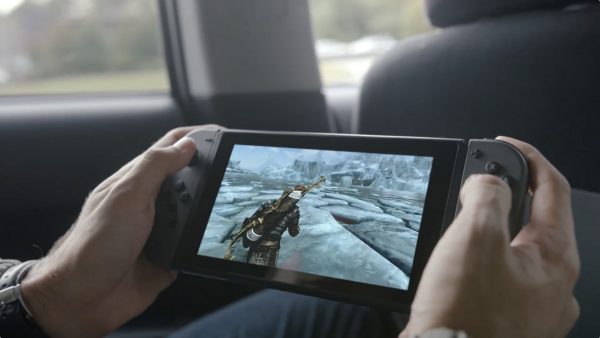The Nintendo Switch has finally been revealed and whilst there are tons of questions, we do know a couple of things about Nintendo’s newest console.
Firstly, it’ll be a dockable machine meaning that when you’re at home it sits in its cradle and outputs images to the TV and when you want to take it with you, the device itself has a screen. The situation with the controllers is a little more complicated as it seems the Switch will come with two mini Wii Remote looking devices. There’s no mention of them being motion controls but they can be used in a variety of ways. The video shows these controls being attached to the side of the device to give the Switch a 3DS look, with buttons on the side. You can also unclip the controllers from the side of the Switch, when it’s docked and otherwise. It also looks like there will be a more standard looking controller available, much like the Wii and the Wii U had a ‘Pro Controller’ for sale. I suggest you go and have a look at the video itself as I’m pretty sure I’ve done a poor job of explaining the myriad of ways that these ‘Joy-Cons’ can be used.
Anyway, the real news isn’t the controllers but it’s the fact this console has finally been revealed. It’s not come too soon either. The Wii U has been a failure by just about any metric – sales figures, software support and the general quality of the games also. That’s not to say it hasn’t had some outstanding titles, this is a Nintendo console after all and Nintendo are still brilliant developers. So even if you’ve not had a Nintendo console in a long time you should probably still be looking forward to the Switch, and here’s why.
Nintendo seem to finally be getting out of their own way with the Switch. They’re more focused than ever.
Recently it seems like Nintendo have finally woken up to modern day gaming and are now making strides to become more relevant than ever. They’ve embraced gaming on phones and tablets, setting up a partnership with DeNA, announcing a Mario game for iOS and having a small part in the success of Pokemon GO.
They’ve realised that mobile gaming is taking some of the steam out of handheld gaming. Mobiles, like your iPhone, are replacing handheld systems like the 3DS.
Rather than giving up on handheld gaming, they’ve developed a home console that is also a handheld console. This means that you no longer have to decide what Nintendo console you’re going to buy this generation. This means that Nintendo are finally giving their fans what they’ve wanted for ages now – a console version of Pokemon and a full-scale Zelda game that they can take on the go. With the Switch, Nintendo are no longer splitting up their fan base into console and handheld gamers. They’ve got one system and they’ve also got eyes on the mobile market too.
The design of the console itself is also refreshingly ‘normal’. By this, I mean there’s no gimmicky functionality that acts as a roadblock to potential developers. With the Wii, the Wii U and the DS & 3DS there was always something ‘unique’ to worry about. What was going to be shown on the second screen? How were the controls going to work with the motion sensors? How can we map all of the commands onto fewer buttons?
This return to basics could allow Nintendo to focus on what they do best – make great games with beloved characters. Super Mario Galaxy never needed motion controls and neither did Skyward Sword but they were shoehorned in as if to make a point. As if to symbolise how ‘vital’ the motion controls of the Wii were. Even on the Wii U, Nintendo’s best games focused purely on traditional mechanics and ignored the ‘unique’ second screen. Splatoon, Smash Brother, New Super Mario Bros U and Mario Kart 8 all barely used the second screen.
It’s not just Nintendo that will be liberated with this lack of gimmickry and return to traditional input methods. Third party developers, who have for so long been absent on Nintendo consoles, could finally have a Nintendo console that’s easier to support.
Nintendo seem to realise that their third party support has been an issue for some time. Whilst it’s true that they touted a bunch of names who were ‘all in’ for the Wii U, only to have them barely support it months after launch (EA, I’m looking at you), I’m slightly more hopeful this time round.
Do I expect Call of Duty, FIFA, Battlefield and the like to be key titles for the Switch? No – of course not. The Switch doesn’t have the hardware to support those big budget AAA games. So whilst having partner like EA and Activision is interesting, to see how those titles do get altered to fit onto the Switch’s hardware, it’s the partnership with Unity and the recent opening of the doors to smaller indie developers. Like the Vita had this generation, the Switch could be the ideal console for smaller indie games and for the less graphically intensive titles coming from the bigger publishers too.
With the Switch, Nintendo aren’t competing with Sony and Microsoft. They’re instead offering a real alternative, they’re appealing to console and handheld fans and they’ve done away with gimmicky controls that scare off developers.


